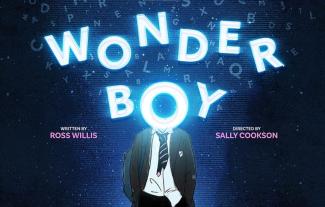Theatre review: Wonder Boy

STAMMA's Social Media Manager Neha reviews the play Wonder Boy, which will be touring the UK from September.
My absolute favourite depictions of disfluency are the ones that shatter the cinematic and literary preoccupation with portraying stammering purely as an internal 'struggle' unaffected by societal attitudes towards disability.
Put simply, I enjoy representations that move away from navel-gazing obsessions with sounding fluent or poster-child narratives that equate progress with a 'cure', towards more spontaneous, wild and unpalatable methods of expression. Stories where speech continues to be a rehearsed and often mechanical performance that one may struggle with to the end, yet expression develops across the narrative into more unpredictable yet honest and intimate ways of relating to those around us.
Wonder Boy, a play written by Ross Willis and directed by Sally Cookson, takes this phenomenon in a new and delightful direction with their larger-than-life construction Captain Chatter. Captain Chatter is a total freak, and that is precisely what makes him wonderful: an endearing embodiment of a stammer that does not say a word yet simply does not shut up. Our protagonist Sonny introduces us very early on to Chatter, the hero of his hand-drawn comic books, kitted out like a cross between a Tour de France participant and something out of Star Trek, who often allows Sonny to avoid public speaking by — well — taking over the stage. Which, of course, is the last thing Sonny needs, after landing a role in a lunchtime production of Hamlet.
Article continues below...

This show plays with the classic saviour-teacher trope in exciting ways, specifically regarding Sonny's teacher Miss Wainwright's position in the school hierarchy, where what she wants to do and what she is allowed to do is dictated by senior school officials who have more rigid, traditional ideas. Wainwright's perspective on stammering and relationship with Sonny is emotionally captivating, but as my colleague Catherine noted in her 2022 review, it would have been interesting to see a speech & language therapist (SLT)'s role in the school space as well as that of his teacher.
Whilst an outside professional such as an SLT cuts less of a romantic, striking figure than a maverick educator, it does feel a little like a missed opportunity to also give a voice for a profession rarely glimpsed on stage and screen. By this, I don't mean that an SLT should serve as a curative presence, not in the slightest — but rather as another professional in the school-space that helps students who stammer gain confidence and come to terms with the way they speak.
Certainly, the narrative addresses very important questions around what a teacher can do for a student and explores the blurred lines between 'duty of care' and surrogacy as Sonny faces parental bereavement. However, Miss Wainwright's presence as the sole supportive adult in Sonny's life does also slightly contribute to the fear that plays like Wonder Boy may become a self-fulfilling prophecy, with teachers forced to fill a role that SLTs leave vacant, due to lack of NHS funding.
Sonny's stammer becomes a lifeline to cling to amidst the narrative chaos of a hyper-fluent world.
Wonder Boy does not constrain itself to debates on fluency, and instead has fresh new takes on several aspects of the school environment and how the archaic literary canon can transform into exciting, positively disruptive adaptations (perhaps a tongue in cheek reference to itself? Either way, I absolutely loved it). The characters' varying engagement with Shakespeare's Hamlet is hilarious throughout, but also makes subtle yet salient points on the rigidity of school curricula and the nature of building upon the old to create the new… one character refers to the play as "a shit version of The Lion King".
Gesture, movement, sound and art carry equal weight in Wonder Boy, appropriate for a play that conveys the importance of varied forms of expression without either under- or over-emphasising the role spoken language plays in school life. Several reviews have noted the expletive-laden back-and-forths of the classroom, generally true-to-life though possibly not suitable for young children, and the sound director must be commended for the complexity with which Sonny interacts with this auditory cacophony. Sometimes slotting right in, sometimes bursting out of it, and sometimes — in the play's most emotive moments — being driven down into total silence.
Considerately captioned, dazzlingly decorated and with an ensemble cast bursting at the seams with personality, Wonder Boy's commitment to sheer excess makes its quieter explorations of self-acceptance and the role of fluency and articulacy within Sonny's conception of himself and his grief stand out as stark and effective. For me, the most unforgettable and momentous scenes are those in which our protagonist is alone on stage, as he stammers his soliloquys. Because they disrupt the cacophonic chorus of a school environment in which everyone talks over the other and no one is heard, and Sonny's stammer becomes a lifeline to cling to amidst the narrative chaos of a hyper-fluent world.
Wonder Boy joins a new legacy of plays showing that just because someone stammers, it doesn't mean they can't be centre stage. In the National Theatre's recent play Nye (in collaboration with the Millennium Theatre Cardiff) we saw the impact of what one person who stammers can do. Hopefully Wonder Boy's UK tour will inspire future young people who stammer to carve out similar legacies for themselves, and we can't wait to see them.
Wonder Boy will be on tour later this year, starting at the Bristol Old Vic on 6th-21st September before moving to Liverpool, Shrewsbury, Wolverhampton, Blackpool, London, Derby, York, Southampton, Salford and Northampton. You can book tickets and find more information on the Wonder Boy website.

































